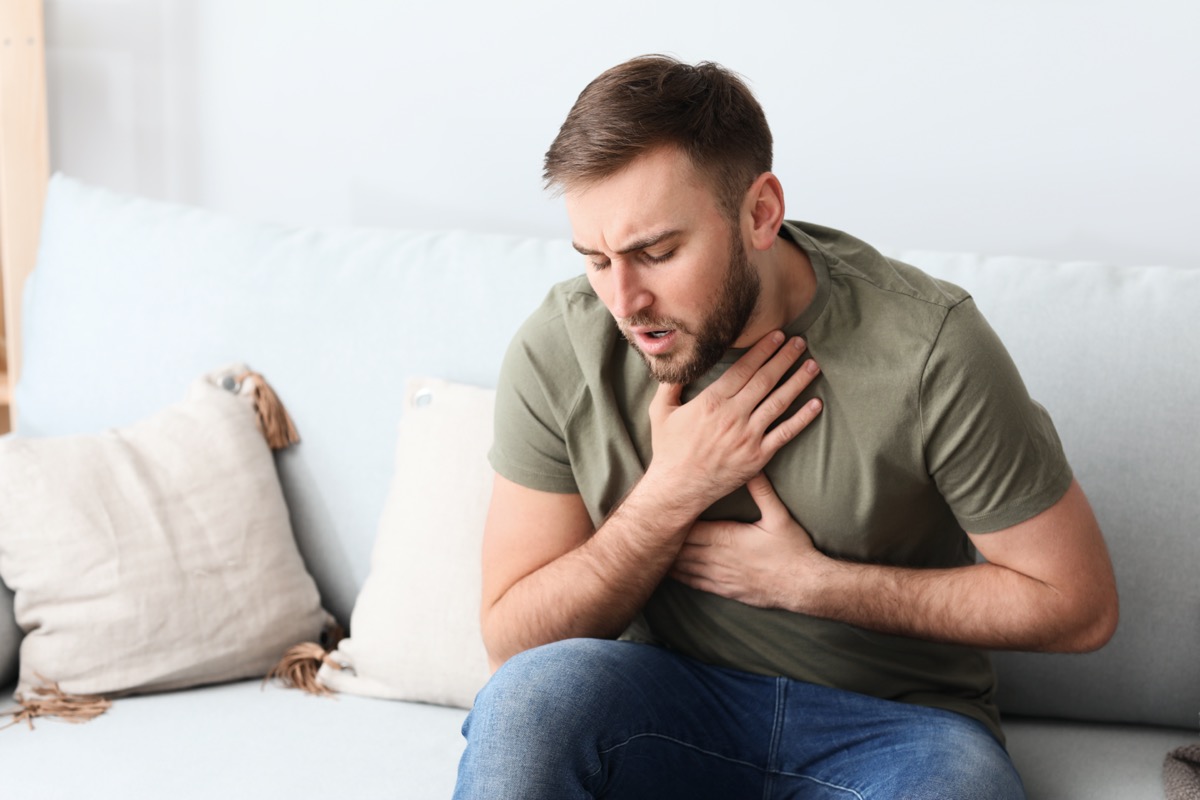If you have had coronavirus, you still need to get vaccinated, say experts like Dr. Anthony Fauci. You may also suffer symptoms that may never go away. Long COVID, and the "long haulers" who have it, never get over their initial infection, and can experience a constellation of harrowing symptoms that are ruining the lives of some 10 to 30% of people who catch coronavirus. "It's been incredibly difficult," Lauren Nichols, Vice President and Long COVID Patient, of the activist group BODY POLITIC, said at the recent 2021 STAT Summit. "The physical pains are one thing." But having a disease that is still being figured out, and that some doctors initially didn't believe existed—"that hurt worse." Now that doctors know Long COVID is real, it's important you know the symptoms. Read on—and to ensure your health and the health of others, don't miss these Sure Signs You've Already Had COVID.
For Nichols and many others, getting COVID didn't feel like simply a respiratory disease. This made it all the more maddening in March of 2020, when she fell ill and doctors didn't know it could be anything else. "For me, my symptoms right off the bat did not emulate anything that the CDC was saying at the time," she said. "I never once felt like I had the flu. Never once felt like I had a cold. Instead for me, my symptoms presented with extremely debilitating fatigue, incredibly painful, lower esophagus burning—it was not a sore throat, was not GERD—very severe, lower GI issues. I had chest pain, shortness of breath, fever, night sweats, loss of taste, loss of appetite, headaches and migraines. I had COVID toes, which was blood pooling on the tips of my toes, tremors. I had smokey smelling stools, cloudy, urine, consistently developed pneumonia at week four. And very quickly developed a worsening symptoms at week four when I was anticipating being recovered and feeling better…And my symptoms, unfortunately in the acute stage, did deteriorate rather quickly, persistent for about three to four months. And that was very, very severe neurological and GI issues during that time in particular." Keep reading to learn about more symptoms.
RELATED: If You Feel This, You May Have COVID Now

For Nichols—like so many others—"the neurological symptoms have actually lasted 20 months. I am still a patient," she said. "The neurological symptoms that I experienced during that time were quite scary. So prior to COVID, I was an extremely healthy, very active 32 year old. I walked six miles to and from work each day and no preexisting conditions other than just terrible insomnia, which, who doesn't have that, it's very common in this day and age.But the neurological symptoms did stop me in my tracks. It was around week five after getting COVID. I had taken a shower and got in the shower, and I remember not knowing how to get out of the shower." She couldn't figure out how to use the door handle. "I didn't know what to do. And I was essentially trapped in my shower and I sat on the shower floor crying because I could not for the life of me understand what that handle was and how to use it. So I did feel as though I had early onset dementia and a lot of patients have echoed this, that we feel that we are—we've got short-term memory loss." She "also have clinically significant aphasia, which has word-finding inabilities.And unfortunately, that has also impacted my ability to do my job, to communicate with others effectively. …There were times where I looked at my hands and I couldn't tell you what they were. I didn't know what these things were called. And, on top of this sort of cognitive effects, I was experiencing tremors and seizures and severe crippling nausea, all neurological, as well as, as neuralgia, which is becoming a hallmark symptom of long COVID." That can cause shock-like pain in the face.
RELATED: What Happens to Your Body When You Smoke Weed, Says Science

"Some people experience a range of new or ongoing symptoms that can last weeks or months after first being infected with the virus that causes COVID-19," says the CDC. "Unlike some of the other types of post-COVID conditions that tend only to occur in people who have had severe illness, these symptoms can happen to anyone who has had COVID-19, even if the illness was mild, or if they had no initial symptoms. People commonly report experiencing different combinations of the following symptoms:
- Difficulty breathing or shortness of breath
- Tiredness or fatigue
- Symptoms that get worse after physical or mental activities (also known as post-exertional malaise)
- Difficulty thinking or concentrating (sometimes referred to as "brain fog")
- Cough
- Chest or stomach pain
- Headache
- Fast-beating or pounding heart (also known as heart palpitations)
- Joint or muscle pain
- Pins-and-needles feeling
- Diarrhea
- Sleep problems
- Fever
- Dizziness on standing (lightheadedness)
- Rash
- Mood changes
- Change in smell or taste
- Changes in menstrual period cycles"
RELATED: Over 60? Stop Doing This ASAP, Say Experts

Long COVID has been called Post-COVID, or a "post-viral" illness, and it's a bit of a misnomer. "We're no longer ill, we're post illness, but we're not post anything—we're still in it," said Nichols. "We're still living it. So I think that's an important distinction. …Long COVID is called long COVID for a reason. So that's one area that we can definitely do better in terms of language. The other is to discuss long COVID in an appropriate way. And what I mean by that is discussing it as it is happening, not talking about it in past tense. Many of us are living it. Not many of us have recovered from it. And in fact, I will tell you that the studies that the patient-led research collaborative or BODY POLITIC has done to show that patients actually deteriorate neurologically beyond six months, and have worsening symptoms. So…using the term 'survivor' is a very loaded term and it doesn't really capture what's happening in our bodies and in our lives. It doesn't validate our experiences calling his patients and calling us 'Long COVID patients' is really the most appropriate way to acknowledge this live reality that we are trapped in at the moment, without really any help or care."
RELATED: Sleeping This Way Can Lead to Depression, Study Shows

There is no cure for Long COVID—not yet anyway. Tell your doctor about your issue and they will aim to treat your symptoms, or find a Long COVID or Post-COVID clinic, as there may be one near you. And support groups like BODY POLITIC are essential resources; join it. Also, get vaccinated (or get your booster when eligible) and to protect your life and the lives of others, don't visit any of these 35 Places You're Most Likely to Catch COVID.
The post Sure Signs You've Already Had COVID, and Now Have Long COVID appeared first on Eat This Not That.
----------------
By: Alek Korab
Title: Sure Signs You've Already Had COVID, and Now Have Long COVID
Sourced From: www.eatthis.com/news-life-ruining-long-covid-sure-signs/
Published Date: Fri, 26 Nov 2021 12:45:27 +0000
Read More
 HealthWellnessFitnessBeautyVideosPrivacy PolicyTerms And Conditions
HealthWellnessFitnessBeautyVideosPrivacy PolicyTerms And Conditions
